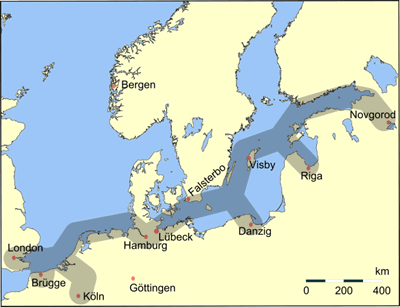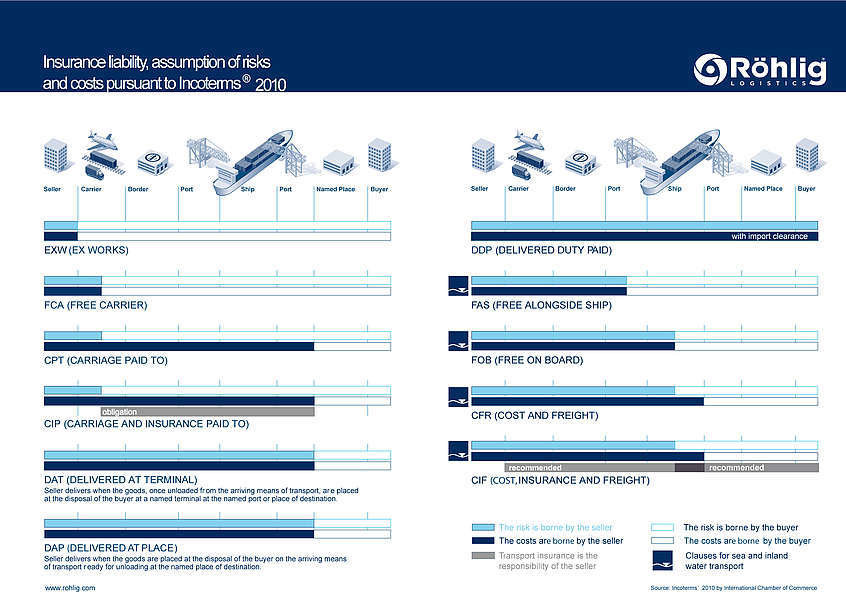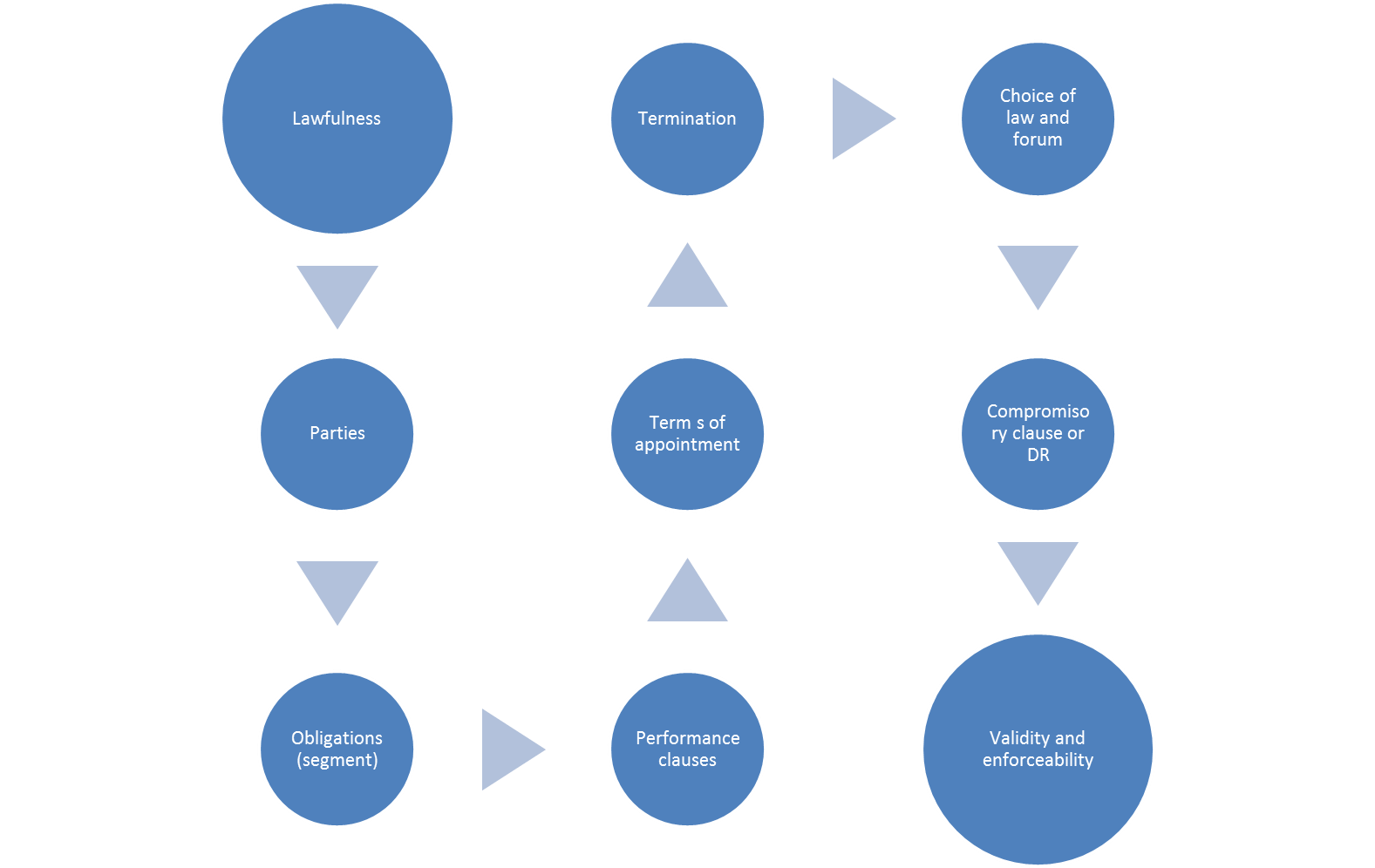Context
Maria Claudia Solarte vasquez
maria.solarte@taltech.ee/mcsolartev@gmail.com


•What are the sources of transnational law?
•Are the differences between legal Systems and legal traditions relevant in international trade? Examples
•Ibi societas, ibi ius - human association is not possible without rules. What is the 'society' we would be referring to in this context?
- Lex Mercatoria (LM) is the Latin expression for a body of trading principles which evolved as a system of customs and practice, and functioned as the international law of commerce.
- It emphasized contractual freedom and disregarded legal technicalities. The medieval trade community wished to overcome the obsolete rules of feudal and Roman law which could not respond to the needs of the new international commerce.
- +800 years old and based in the ancient Roman ius gentium.

Hanseatic League trading routes. Source: Agent Human: Consciousness at The Service Of The Group
Does LM have an autonomous character (independent from any national system of law)?
-Autonomist view vs. positivists view (ultimately founded on national law).
With regard to its substantive quality:
-LM features autonomous legal order characteristics.
-LM is an alternative to an otherwise applicable national law.
-LM consist of international trade practices, which complement traditional applicable law.
a. Transnational law is not a synonym of LM. The former is a wider branch, composed of regulations on cross-border activities that are economically and legally relevant, including private and public international law, and other rules and practices. Examples of each?
b. LM, according to most, is part of the transnational law concept, and may be unwritten and evolving without the explicit intervention of states.
Lex Mercatoria
-
Applied in Arbitration
-
Content:
–contract
–customs and usages of international trade international conventions
–general principles of law
–equity
The LM may seem vague and incomplete because 'it cannot be fully classified' (there are very few general principles of trade law that can be universally recognized). It, in fact, does not provide an answer for specific legal issues such as validity. If it is a specific branch, why should it?
Discuss this claim: A major problem of the LM is that 'it is not binding.' 'It is not enacted by the legislator or endorsed in an international convention.'
Consider, however, that legal pluralism allows to argue that the LM belongs to the domain of law as it may be the source of legal obligations. The legal bonds would depend of the sanctions established and the social arrangements enforcing or applying certain rules.
Mainstream opinion:
Even if configured as legal rules, the bundle of propositions that constitute the LM does not qualify as a legal system. The societas mercatorium cannot present its doctrine and notions in a systematic order, and there is not a single international community of merchants (yet?), but a diversity of groups instead. There are only principia mercatoria.
-Where does the CISG convention belong?
Both the LM and Transnational Law (TL) are applied by arbitration tribunals. They derive from:
1. Jurisprudence
2. Contract and international conventions (CISG). In arbitration clauses, LM is rarely mentioned. Usually they refer to the general principles of law, the usages of international trade, transnational law, etc. Are arbitral tribunals authorized anyway to apply LM or should the parties have this explicit choice of law clause in the contract?
3. Customs and usages of international trade international conventions – Standard conditions and contracts of trade
4. General principles of law -doctrine
5. Equity - fairness
Arbitral tribunals are needed to develop and promulgate the LM. Parties to an international commercial dispute cannot rely on domestic courts to enforce an agreement or award based exclusively on LM.
The award is still valid even if it is based on usage without reference to national law. Arbitrators are completely independent, even institutional arbitrators, and therefore not bound to apply any national law or even rules of conflict.
Besides, no domestic legal system denies enforcement of an arbitral award simply because it is based on lex mercatoria.
Art 9 CISG
(1) The parties are bound by any usage to which they have agreed and by any practices which they have established between themselves.
(2) The parties are considered, unless otherwise agreed, to have impliedly made applicable to their contract or its formation a usage of which the parties knew or ought to have known and which in international trade is widely known to, and regularly observed by, parties to contracts of the type involved in the particular trade concerned.
Principles
- UNIDROIT principles of International Commercial contracts
- Preamble: Purpose of the Principles
These set general rules for international commercial contracts and apply when the parties have agreed that their contract will be governed by general principles of law, LM or the like.
In groups, find the meaning of the following expressions and a sample case or provision reflecting it:
-Rebus sic stantibus
-Consensus facit legem
-De jure and de facto
-Performance in good faith
-Caveat emptor
-The core of a right is more protected than its periphery
- Culpa in contraendo
-Use creates presumption of acceptance
-Actori incumbit probatio
-Force majeure
-Exceptio non adempleti contractus
-expressio unius est exclusio alterius
-Volenti non fit iniuria
Equity = LM
Specific agreement for Ex aequo et bono
Applicability lex mercatoria without agreement

International Exchange is determined by Two main criteria:
a. Is the transaction linked to different countries' legal systems?
b. Is the contract drafted as an international agreement?
What is the difference between international exchange and international sale of goods? What are the criteria for the application or non-application of the CISG?
Transnational Law diffuses the borders between the public and the private international legal systems especially focused on political economy and international commerce standards.
For judges TL is a subsidiary source of law
In arbitration TL, and therefore LM are the main source of law

Source: http://www.law.qmul.ac.uk/research/centres/clsgc/comp/index.html
Importance of transnational laws
1. International exchange is in a constant increase:
-Trans-oceanic relations
-Regional pacts and regimes
-Global trade (digital markets)
2. Domestic legal systems are unfit to regulate trade at the speed that it requires. New rules of trade have become necessary
Sources
-Treaties (ratified or not, soft law): CISG, UNCITRAL, UNDIDROIT
-Contracts and self regulation
-Jurisprudence as principles: UNDIDROIT
-Model Contracts: UNCITRAL
-Practice: UNIDROIT
-Uses: INCOTERMS
-Doctrine: UNIDROIT,LM
-Principles: UNDIDROIT 2016, TRANSLEX and others (Ripert regarded these developments as a strong indication for the existence of common principles and rules (‘fonds commun’) in the legal systems of the world)
Sample Award with a list of principles
ICC Award No. 8365, Clunet 1997, at 1078 and seq (https://www.trans-lex.org/208365/_/icc-award-no-8365-clunet-1997-at-1078-et-seq/)
Incoterms 2010
|
Rules for any transport mode
|
Rules for sea & inland waterway only
|
Incoterms 2010

Incoterms 2020 Chart

Source: https://www.conquerornetwork.com/
Building blocks of an international contract

Drafting exercise
Draft an international contract according to the information provided
References
-Goldman, B., ‘The Applicable Law: General Principals of Law—The Lex Mercatoria’, in: Lew, J.D., [Ed.], Contemporary Problems in International Arbitration, Centre for Commercial Law Studies (1986) 113, at p. 125 et seq.
-www.IncotermsExplained.com
-Ripert, G., ‘Les règles du droit civil applicables aux rapports internationaux’, 44 Rec. Cours 1933-II, 569, at p. 588 et seq.
-Schmitthoff, C., International Trade Usages, ICC (1987), p. 47
-www.Trans-lex.org

Copy of Lex Mercatoria
By mtalyc
Copy of Lex Mercatoria
- 371



